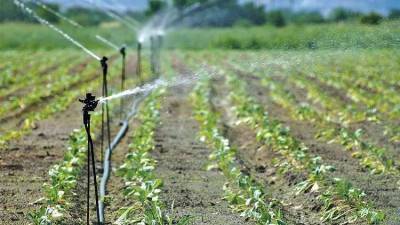CHANDIGARH / NEW DELHI, 21 July 2024 : strong>CHANDIGARH / NEW DELHI: India, a land of vibrant agricultural traditions, faces the constant challenge of balancing water scarcity with food security needs. Irrigation, the lifeblood of agriculture, plays a pivotal role in ensuring optimal crop yields and maximizing land productivity.
Let's delve into the top irrigated states in India, exploring their irrigation prowess and the factors contributing to their success.
Punjab: The Crown Jewel of Irrigation
Punjab, aptly nicknamed the "Granary of India," reigns supreme in terms of irrigation coverage. Boasting a staggering 98.7% of its net sown area under irrigation, Punjab's success can be attributed to several factors:
Extensive Canal Network: The state benefits from a well-developed canal system, including the prestigious Indus Basin Canals, ensuring efficient water distribution to agricultural lands.
Subsidized Electricity: Government subsidies for electricity used in irrigation pumps make water extraction more affordable for farmers, facilitating wider irrigation adoption.
Progressive Farming Practices: Farmers in Punjab have embraced drip and sprinkler irrigation techniques, promoting water conservation and ensuring efficient water use.
Haryana: Chasing the Irrigation Champion
Haryana, Punjab's neighbor, closely follows with a high irrigation coverage of over 88% of its net sown area. Factors contributing to Haryana's irrigation success include:
Proximity to Source Rivers: The state's proximity to major rivers like the Yamuna and Sutlej facilitates the development of canal systems for irrigation purposes.
Focus on Micro-Irrigation: Haryana actively promotes micro-irrigation technologies like drip and sprinkler systems, leading to significant water savings and improved crop yields.
Government Initiatives: Government schemes offering subsidies for installing micro-irrigation systems and promoting water conservation practices play a crucial role in driving irrigation adoption.
Uttar Pradesh: The Land of Diverse Irrigation Practices
Uttar Pradesh, with an irrigation coverage exceeding 60% of its net sown area, boasts a diverse irrigation landscape. While canals play a significant role, the state also utilizes:
Groundwater Irrigation: Tubewells and borewells are extensively used to tap into groundwater resources, ensuring irrigation access even in remote areas.
Traditional Irrigation Methods: Traditional methods like rainwater harvesting and canals built on smaller rivers provide supplemental irrigation, particularly for small and marginal farmers.
Andhra Pradesh: An Irrigation Powerhouse of the South
Andhra Pradesh, a leader in South Indian agriculture, boasts an irrigation coverage exceeding 55% of its net sown area. Key factors driving irrigation development include:
Large Reservoir Network: The state possesses a network of large reservoirs like Nagarjuna Sagar and Krishnaveni, providing reliable water storage for irrigation needs.
Canal System Expansion: Andhra Pradesh has continuously focused on expanding its canal network, increasing water accessibility for a wider agricultural area.
Micro-Irrigation Focus: The state is actively promoting micro-irrigation technologies, particularly in drought-prone regions, to optimize water utilization.
Other Notable Irrigated States
Several other states deserve recognition for their irrigation efforts:
Tamil Nadu: With a focus on canal irrigation and micro-irrigation techniques, Tamil Nadu demonstrates successful water management practices.
Maharashtra: This western state utilizes a combination of canal irrigation, groundwater irrigation, and micro-irrigation to meet its agricultural water needs.
Karnataka: Canal irrigation from major rivers like the Krishna and Kaveri, along with groundwater and micro-irrigation techniques, contribute to Karnataka's irrigation success.
Challenges and Looking Ahead
Despite the progress made, challenges remain.
Overdependence on Groundwater: Excessive reliance on groundwater resources can lead to depletion of aquifers, necessitating sustainable water management practices.
Inefficient Irrigation Systems: Upgrading aging canals and promoting water conservation technologies are crucial for optimizing water use.
Reaching Small and Marginal Farmers: Ensuring equitable access to irrigation infrastructure and resources for all farmers, particularly small and marginal landholders, is essential.
A Collective Journey for Sustainable Irrigation
The top irrigated states in India showcase the power of efficient water management in fostering agricultural growth. By fostering innovation in irrigation technologies, promoting water conservation practices, and ensuring equitable access to irrigation infrastructure, India can embark on a collective journey towards a more sustainable and prosperous agricultural future.
Image credit: Zeebiz.com




















